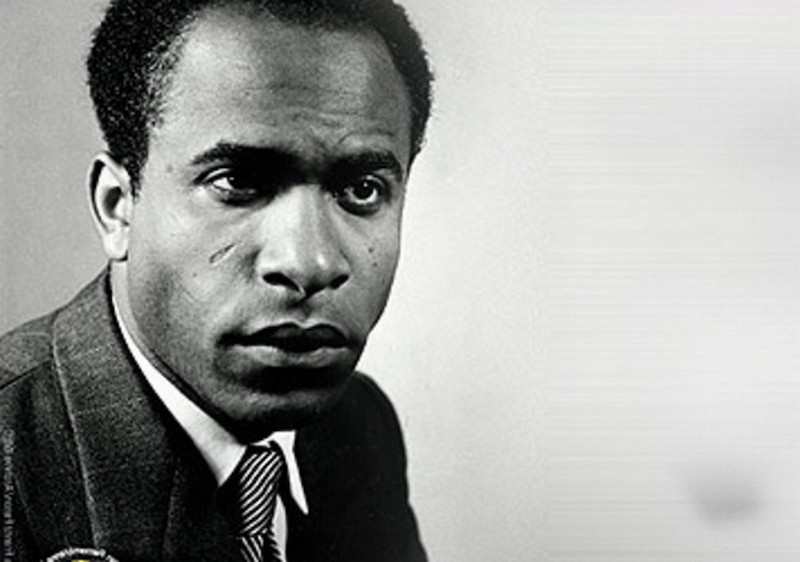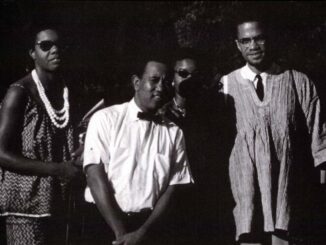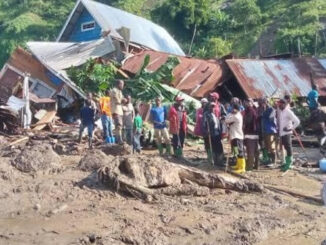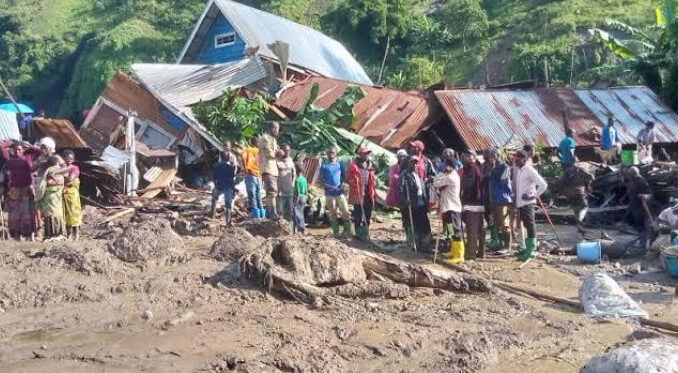
Editor’s Note: The following is the writer’s analysis.
“The master’s room was wide open. The master’s room was brilliantly lit, and the master was there, very calm… and our people stopped dead… it was the master… I went in. “It’s you,” he said, very calm. It was I, even I, and I told him so, the good slave, the faithful slave, the slave of slaves, and suddenly his eyes were like two cockroaches, frightened in the rainy season… I struck, and the blood spurted; that is the only baptism that I remember today.” —Aimé Césaire
Today marks the 60th anniversary of the passing of one of the greatest thinkers to have emerged from the ranks of the oppressed, Frantz Fanon (1925-1961).
Fanon’s contributions are timeless. As long as white supremacy and neocolonialism remain in the driver’s seat of human relations, Fanon’s thought will continue to arm the colonized in the Battle of Ideas.
The Radicalization of Fanon
Born and raised in what is still France’s Caribbean island colony of Martinique, Fanon was exposed to and shaped by the everyday class and race relations that characterized the island in the early 20th century. Forced to join a segregated column of Black troops, he fought in World War II. Upon continuing his studies in post-war France, he came face to face with the racism that dominates the European world. In his first book, Black Skin, White Masks (1952), Fanon reflects on coming of age in a world, where, “For the black man there is only one destiny. And it is white.” At the time of publication, Fanon had just turned 27.
In 1953, the Martiniquais psychiatrist was assigned to Algeria, where he treated patients who were severely traumatized by the violence French colonialism had spun into motion. He met Dr. Pierre Chaulet, a French doctor who secretly treated members of the guerrilla resistance, Front de Libération Nationale (FLN), who had survived torture and captivity. “Viscerally close to his patients whom he regarded as primarily victims of the system he was fighting,” Fanon immediately became a cadre of the Algerian Revolution.1
By 1956, Fanon’s consciousness no longer allowed him to oversee operations at Blida Hospital in Algeria. In an influential resignation letter that moved many on the left, he wrote:
“There comes a time when silence becomes dishonesty. The ruling intentions of personal existence are not in accord with the permanent assaults on the most commonplace values. For many months my conscience has been the seat of unpardonable debates. And the conclusion is the determination not to despair of man, in other words, of myself. The decision I have reached is that I cannot continue to bear a responsibility at no matter what cost, on the false pretext that there is nothing else to be done.”
The Wretched of the Earth
Fanon produced a prodigious amount of intellectual work. Toward the African Revolution is a compilation of his writings on forging African and Third World unity with the Algerian Revolution at the vanguard of this process.2 A Dying Colonialism explores how the Algerian people threw off their internalized inferiority complex by turning away from the colonizer’s cultural practices and embracing their own traditions.3
He dedicated his last days to dictating the final ideas of his most moving work to his wife, Josie. Six decades after it first hit the streets of Paris, The Wretched of the Earth: The Handbook for the Black Revolution That Is Changing the Shape of the World is as accurate and explosive as ever. The title comes from the line “Arise, ye wretched of the earth” from “The Internationale,” the Second Communist International’s official anthem, and from Haitian communist intellectual Jacques Romain’s poem, “Sales négres:”
too late it will be too late
on the cotton plantations of Louisiana
in the sugar cane fields of the Antilles
to halt the harvest of vengeance
of the negroes
the niggers
the filthy negroes
it will be too late I tell you
for even the tom-toms will have learned the language
of the Internationale
for we will have chosen our day
day of the filthy negroes
filthy Indians
filthy Hindus
filthy Indo-Chinese
filthy Arabs
filthy Malays
filthy Jews
filthy proletarians.
And here we are arisen
All the wretched of the earth
all the upholders of justice
marching to attack your barracks
your banks
like a forest of funeral torches
to be done
once
and
for
all
with this world
of negroes
niggers
filthy negroes.4
How many revolutionaries the world over became enraptured in his eloquent portrayal of the “Manichaean” differences between the neighborhoods of the rich white colonizer in Algiers and the casbah (ghettoes) of the colonized?
Here within this classic, that all revolutionaries have a duty to study, reside some of the most poignant prose on how the oppressed internalize violence and project it onto themselves:
“Where individuals are concerned, a positive negation of common sense is evident. While the settler or the policeman has the right the livelong day to strike the native, to insult him and to make him crawl to them, you will see the native reaching for his knife at the slightest hostile or aggressive glance cast on him by another native, for the last resort of the native is to defend his personality vis-a-vis his brother.”
Based on his treatment of patients in the Blida Hospital, which today bears his name, Fanon’s final chapter, “Colonial War and Mental Disorders,” examines the “ineffaceable wounds that the colonialist onslaught has inflicted on our people.”5
The fundamental pillar of the book, however, was Fanon’s conviction that the colonized could only shed their fear and shame through a baptism of revolutionary violence. Fanon’s former high school teacher and mentor, Aimé Césaire, had a profound influence on him. Césaire’s words cited at the beginning of this article from his epic poem on slave liberation, “And the Dogs were Silent,” set the tone for the Fanonian worldview. Despite a chorus of liberal complaints from the West that Fanon was “too violent,” Fanon concluded:
“As you and your fellow men are cut down like dogs, there is no other solution but to use every means available to reestablish your weight as a human being.”
‘You Can Kill a Revolutionary, But You Can Never Kill the Revolution’
Though Fanon died of leukemia when he was only 36, revolutionaries the world over have picked up his fallen weapons, his ideas, and applied them to their own particular national liberation struggles. Fanon’s observations and thesis continue to mold the thinking of awakening generations in life-and-death struggles from Johannesburg to Gaza to Harlem.
As political prisoner Mumia Abu-Jamal writes, the Black Panthers were Fanonists. His audio essay and tribute to Fanon discuss what the psychiatrist’s anti-colonial perspicacity meant to a 15-year-old Mumia, who has spent 40 years in prison. In Seize the Time, Bobby Seale talks about the influence of Fanon on the young Panthers and how Huey P. Newton read the book seven times.6
Malcolm X, Ernesto “Che” Guevara and Nelson Mandela all traveled to independent Algeria, which emerged as an epicenter of Pan-Africanism and internationalism. Paulo Freire stated that he had to rewrite Pedagogy of the Oppressed after reading The Wretched of the Earth. Hamza Hamouchene, president of the London-based Algerian Solidarity Campaign, discusses in CounterPunch what he deems Fanon’s unique contributions to understanding nationalism, the national bourgeoisie, political education and universalism, among other themes.
It is important to highlight that Fanon was more than just a doctor and writer.
At his graveside, Vice-president of the Provisional Government of the Algerian Republic (GPRA) Krim Belkacem emphasized Fanon’s diverse roles in the FLN’s total war. Beginning in 1954, Fanon worked as a writer, editor and propagandist for FLN periodicals Résistance algérienne and El Moudjahid. He also was a researcher; lecturer; a FLN representative in Ghana, Ethiopia, Mali, Guinea and Congo; as well as a clandestine militant.
Looking at the work of Karl Marx, Steve Biko, Cedric Robinson, Sylvia Wynter and other examples of revolutionaries/intellectuals, the Tricontinental: Institute for Social Research wrote a tribute to Fanon because of how he embodied the praxis of a radical or organic intellectual: “The world will only be shaped by the most valuable insights of philosophical striving when philosophy itself becomes worldly via participation in struggle.”
Fanon survived an assassination attempt, exile in Tunis and was staring down a crippling disease that he refused to talk about but that ultimately claimed his life. Aware he was dying, he pledged, “I will not cease my activities while Algeria still continues the struggle and I will go on with my task until my dying day.”7
Today, it is more necessary than ever to study Fanon to understand the psychological, emotional and spiritual damage wrought by neo-colonialism on the peoples of Africa, the Americas, Asia and what the Black Panthers referred to as the United States’ internal colonies. Fanon’s conclusion in The Wretched of the Earth on African and human liberation begs the same questions six decades later:
“Let us waste no time in sterile litanies and nauseating mimicry. Leave this Europe [U.S.A.] where they are never done talking of Man, yet murder men everywhere they find them, at the corner of everyone of their own streets, in all the corners of the globe.”
Danny Shaw is a professor of Caribbean and Latin American Studies at the City University of New York. He frequently travels within the Americas region. A Senior Research Fellow at the Center on Hemispheric Affairs, Danny is fluent in Haitian Kreyol, Spanish, Portuguese and Cape Verdean Kriolu.
Notes
1 Fanon, Frantz. Toward the African Revolution. New York: Grove Press. 1964.
2 Fanon, Frantz. Toward the African Revolution. New York: Grove Press. 1964.
3 Fanon, Frantz. A Dying Colonialism. New York: Grove Press. 1965.
4 Macey, David. Frantz Fanon: A Biography. London and New York: Verso. 2012.
5 Macey, David. Frantz Fanon: A Biography. London and New York: Verso. 2012.
6 Seale, Bobby. Seize the Time: The Story of The Black Panther Party and Huey P. Newton. Random House: 1970.
7 Macey, David. Frantz Fanon: A Biography. London and New York: Verso. 2012.




